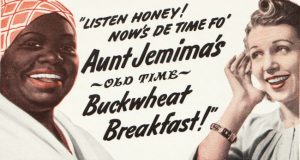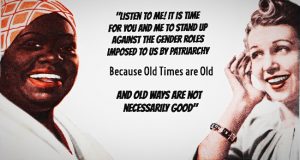
This Aunt Jemima pancake ad is from 1941. The text suggests that Aunt Jemima who is somewhat dressed like a civil-war era African-American slave, is likely to suggest that she is well- pleased perform such domestic function with a happy disposition. The other woman who is white, appears to be relieved when as Aunt Jemima makes such statement. Making this ad suggest some racist overtones. The other way to think of this ad, is Aunt Jemima, the black African- American slave, seems to teach the white woman on how to make a buckwheat breakfast. Which suggest, regardless of race, a woman is ought to learn how to function as a domestic servant. This ad, though was released in the 1940’s suggests that the institution of slavery being embodied to aunt Jemima is necessary in order to train and educate women about their role in society- which is to be submissive. The facial reaction of the other white woman is somewhat uncertain, which suggest either she is uncertain to make such meal or she is uncertain whether she has to function as an African- American slave has functioned. This advertisement, suggest that both African- Americans and women are ought to function as servants. The historical bearing of what seems to be the transfer of the “art of servitude” from a black slave to a modern woman very well- pronounced.

The basic principle behind the jammed advertisement of the said Aunt Jemima ad, is as per my analysis, Aunt Jemima acts like a didactic medium to propagate the covert gender and racial inequality known during that time. The culture jam that I did took the role of Aunt Jemima and make her an empowered woman who ought to teach the other woman not to yield to gender expectations of patriarchy. Another point to consider with this culture jam, is the fact that an African- American who was dressed like a slave is empowered to reach and teach a woman who appears to be above her class- as per civil war era status quo- seems revolutionary. That the demand of equal treatment of women regardless of race and class is a progressive action towards of what seems to be a positive response from a modern society. The text suggests, aside from the liberation of women in their gender roles, proposes a change of attitude towards such changes. That not all things in the past are worth preserving, because not all things in the past are fair. An instantiation of such unfair practice in the past are both the marginalization of women and a specific ethnic group.